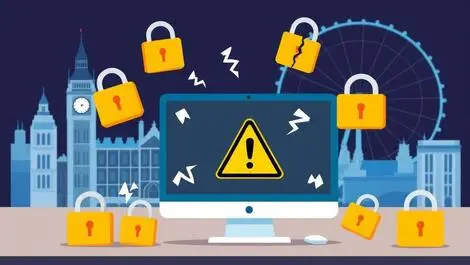Cybercrime stories - Page 1
Any use of network connected electronic devices such as computers or smartphones for criminal activity
is classified as cybercrime. With a long history starting with the misuse of telephone systems (such as
‘phreaking’), cybercrime today includes the creation and distribution of viruses, ransomware, keyloggers
and other malware, the download and use of malware produced by others, social engineering tactics
such as phishing or (physical) impersonation, the theft and use of credentials for accessing computer
systems or networks, and the theft of privileged data. Cybercrime is a broad and dynamic field, with
cybercriminals constantly adapting their methods in pursuit of usually financial goals, but also
occasionally seeking to disrupt, embarrass or shame their targets.

CISOs brace for rise in AI-driven cyber attacks & domain threats
Today
#
ransomware
#
risk & compliance
#
ai
Almost all CISOs foresee a rise in AI-driven cyber attacks and domain threats over the next three years, citing complex risks and low confidence in defences.

Phishing-as-a-Service drives surge in cybercrime for 2025
Last week
#
saas
#
firewalls
#
encryption
Phishing-as-a-Service, powering 60-70% of attacks, is lowering barriers in cybercrime, letting novices launch large-scale scams in 2025.

NZ cyber incidents cause NZD $7.8 million loss in early 2025
Last week
#
phishing
#
advanced persistent threat protection
#
email security
New Zealand's cyber incidents in Q1 2025 caused NZD $7.8 million in losses, marking a 14.7% rise and the second-highest quarterly total ever reported.

UK public sector unprepared for cyber-attacks, survey reveals
Last week
#
ransomware
#
it training
#
phishing
Survey shows 60% of UK public sector IT leaders see cyber-attacks as inevitable, with phishing and ransomware posing top threats amid weak defences.

Kiwis warned over AI-driven scams as tax season boosts risks
Last week
#
malware
#
advanced persistent threat protection
#
physical security
Kiwis face rising AI-driven scams this tax season, with cybercriminals using stolen data and fake Inland Revenue contacts to target taxpayers.
EvilProxy & ClickFix attacks pose new challenge for email security
Last week
#
malware
#
firewalls
#
phishing
Barracuda warns that updated EvilProxy phishing and new ClickFix social engineering attacks are challenging email security worldwide by evading detection methods.

SentinelOne celebrates four Australian winners at APJ awards
Last week
#
digital transformation
#
advanced persistent threat protection
#
cybersecurity
SentinelOne has honoured four Australian partners, including SALTT Technologies and Novo3, at its 2025 APJ awards for excellence in enterprise security collaboration.

Ninety per cent of local firms pay ransomware demands, report finds
Last week
#
data protection
#
ransomware
#
data privacy
Over 90 per cent of Australian firms hit by ransomware last year paid the demanded ransom, as attackers increasingly target backup and cloud systems, a report reveals.

ClickFix phishing surge spoofs Booking.com to target hotels
Last week
#
malware
#
phishing
#
email security
Phishing campaigns spoofing Booking.com have surged, targeting hotels with fake CAPTCHA sites that trick staff into installing malware, research reveals.

Basic security controls could prevent most major data breaches
This month
#
malware
#
data protection
#
ransomware
Basic cyber security controls could prevent the majority of major data breaches, says analysis of UK and Australian data affecting tens of millions annually.

Scattered Spider targets UK retailers with advanced phishing
This month
#
firewalls
#
ransomware
#
network security
The cybercriminal group Scattered Spider has launched sophisticated phishing attacks targeting UK retailers, exploiting social engineering and advanced MFA-bypass tools.

AI accelerates ransomware threat as attacks surge globally
This month
#
ransomware
#
pam
#
cloud security
Ransomware attacks surged globally last year, with 69% of organisations breached and AI increasingly used to automate and intensify cyber threats.

Retail cyber-attacks surge as weak defences lure criminals
This month
#
devops
#
mfa
#
phishing
Retailers face a surge in cyber-attacks as weak defences and lapses in multi-factor authentication make them prime targets for criminals seeking valuable data.

HMRC hit by GBP £47 million phishing scam affecting 100,000
This month
#
data protection
#
phishing
#
physical security
HMRC has lost GBP £47 million in a phishing scam affecting 100,000 taxpayers, exposing vulnerabilities in government cybersecurity protocols.

Fortinet boosts workspace security suite with AI & new tools
This month
#
malware
#
uc
#
firewalls
Fortinet launches AI-powered FortiMail Workspace Security suite to safeguard email, browsers, and collaboration tools amid rising hybrid work cyber threats.
KnowBe4 shares tips to spot eco-themed cyber scams
This month
#
phishing
#
advanced persistent threat protection
#
email security
KnowBe4 warns of a rise in eco-themed cyber scams on World Environment Day, urging caution and secure practices to protect supporters of green causes.
Cybercriminals harness AI to boost phishing & malware attacks
This month
#
malware
#
ransomware
#
phishing
Cybercriminals are increasingly using AI to create sophisticated phishing and malware attacks, complicating detection and raising cybersecurity risks globally.

UK businesses neglect printer security despite rising risks
This month
#
it training
#
data privacy
#
sharp
Despite rising cyber threat awareness, only 14% of UK employees trained on security receive printer-specific training, leaving devices vulnerable.

AI accelerates identity fraud as firms overestimate defences
This month
#
fintech
#
physical security
#
ai
Significant rise in identity fraud targeting European firms, with 59% reporting more attacks despite 74% feeling confident in their defences, Signicat finds.

Russian Market remains key player in cyber credential theft
This month
#
saas
#
malware
#
cloud security
Russian Market remains pivotal in cyber credential theft, with over 136,000 alerts in 2024 for stolen credentials sold at just USD $2 each.